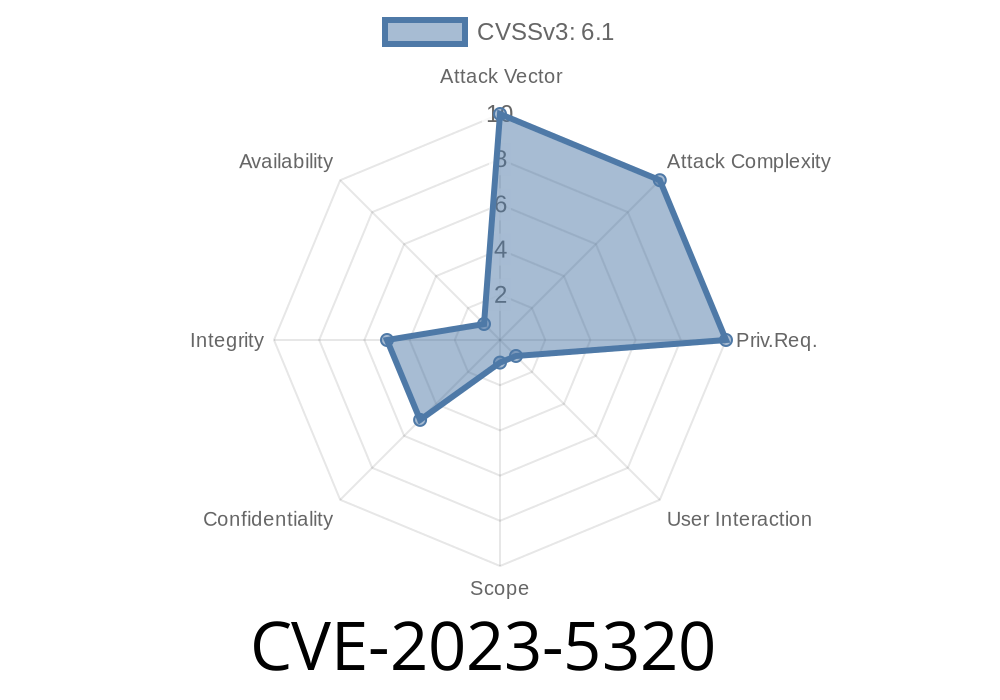An important security vulnerability has been identified in the GitHub Repository thorsten/phpmyfaq prior to version 3.1.18. This vulnerability, officially tagged as CVE-2023-5320, exposes the affected platforms to Cross-site Scripting (XSS) - DOM attacks. In this long-read post, we'll discuss the details of this vulnerability, the dangers posed by Cross-site Scripting, and the steps to mitigate this security risk.
Vulnerability Details
Cross-site Scripting, commonly referred to as XSS, is a web application vulnerability that enables attackers to inject malicious scripts into webpages viewed by other users. The DOM-based XSS vulnerability focuses specifically on the Document Object Model (DOM), which is an essential component of web application functionality.
Researchers discovered that the GitHub Repository thorsten/phpmyfaq is vulnerable to this type of XSS attack, enabling attackers to compromise user data and manipulate the actions of users who interact with the affected webpages.
Exploit Details
The vulnerability is found in the "index.php" and "ajax.master" files. The exploit takes advantage of the lack of proper sanitization of user input in the vulnerable sections of these files. To understand the exploit, here's a code snippet demonstrating the affected portion of the index.php file:
// index.php
$faqSearch->userInput = $userInput;
// Assign variables
$PMF_LANG['msgSearch'] = str_replace('%search%', $userInput,
$PMF_LANG['msgSearch']);
The vulnerable piece of code above does not sanitize the $userInput variable and displays its content directly on the webpage. An attacker can craft a URL containing malicious JavaScript and trick a user into clicking on it. When the user clicks on the malicious link, the JavaScript will execute in the context of the user's browser.
For example, an attacker could use the following malicious URL to execute their script
https://example.com/phpmyfaq/index.php?search='><script>eval(atob('d2luZG93LmxvY2FaW9uPSJodHRwczovL21hbGljaW91cy5jb20i'))</script>;
This example demonstrates a crafted URL containing base64-encoded JavaScript, which, when executed, will redirect the user to a malicious website.
Original References
The official documentation of this vulnerability, CVE-2023-5320, can be found in the National Vulnerability Database:
- NVD - CVE-2023-5320
The GitHub Repository thorsten/phpmyfaq is available here
Mitigation Steps
To protect your phpMyFAQ installation from this vulnerability, it is highly recommended to update to version 3.1.18 or later. The latest release features important security patches that help guard against this DOM-based XSS vulnerability along with other security improvements.
Additionally, developers and administrators must make sure to properly sanitize user input, especially in cases where the input may be reflected back into the DOM.
Conclusion
CVE-2023-5320 poses a significant security risk to platforms using the affected versions of the thorsten/phpmyfaq repository. By updating to the latest version and implementing the necessary safeguards, developers and web administrators can ensure that their platforms remain secure against this DOM-based XSS vulnerability.
Timeline
Published on: 09/30/2023 01:15:00 UTC
Last modified on: 10/02/2023 20:13:00 UTC
